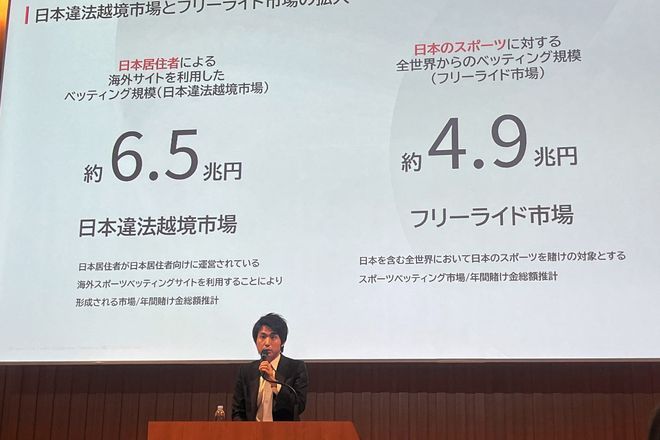Gamblers in Japan illegally bet 6.5 trillion yen ($46 billion) on sports through overseas websites in 2024, a sign the nation should ratify an international treaty on preventing match-fixing, a group said.
Betting on sports competitions has become a huge business in many countries. But most forms of sport gambling, including online wagering on competition outcomes, are prohibited in Japan.
The Council for Sports Ecosystem Promotion (C-SEP) released its estimated Japanese wager amount during a symposium in Tokyo on May 14.
C-SEP, a Japanese general incorporated foundation aimed at expanding the sports industry, said these overseas websites have been gaining a “free ride” on sport competitions in Japan.
Last year, 4.9 trillion yen was wagered through such sites on baseball, soccer, basketball and other sports played in Japan, C-SEP officials said.
Of this amount, 3.8928 trillion yen was wagered by people overseas and 1.0183 trillion yen was placed in bets by residents of Japan.
Soccer, including J.League matches, accounted for the largest slice of the bets, at 2.8534 trillion yen, followed by Nippon Professional Baseball, at 882.9 billion yen, and basketball, including B.League games, at 522.3 billion yen.
About 60 percent of the bets on Japanese soccer were placed from China, compared with just over 10 percent from Japan.
Sixty percent of the bets on Japanese baseball were placed from Japan, the officials said.
Some sports betting websites overseas were found livestreaming the action from professional sport competitions in Japan, as well as using team logos and even portraits of athletes, without permission, the officials added.
C-SEP Representative Director Hironori Inagaki, who is also a lawyer, recommended that Japan ratify the Convention on the Manipulation of Sports Competitions, which the Council of Europe brought into effect in 2019.
More commonly known as the Macolin Convention, the international arrangement calls on public authorities and sport organizations to work together to prevent match-fixing and other irregularities.
Inagaki said the convention has been signed by 43 countries and ratified by 14 so far.
“There is a pressing need, for Japan as well, to build a similar arrangement and join a similar framework of international cooperation,” Inagaki said.
Yuki Ota, an Olympic fencing medalist and an International Olympic Committee member, also took part in the symposium.
He explained that 1.65 trillion yen was bet on events at the 2024 Paris Summer Olympics.
“Many Japanese athletes compete in the Olympic Games, so there is a need for integrity education,” Ota said.
Toshikazu Yamaguchi, president of the Yomiuri Shimbun Holdings newspaper publisher who is also owner of the Yomiuri Giants baseball team, expressed remorse over the recent revelation that some ballplayers, including Giants’ members, were involved in illegal gambling on online casinos.
“With the spread of smartphones, there is a greater risk than a decade ago of players being involved in gambling,” Yamaguchi said. “Japan should work toward signing and ratifying the Macolin Convention to prevent the nation’s sporting world from being polluted with gambling and manipulation, which are descending on us from overseas.”
He also pointed out there is no joint public-private body in Japan to address the issue.
“We should learn from cases overseas and promptly discuss the matter,” he said.
(This article was written by Kosuke Inagaki and Taisuke Goto.)
